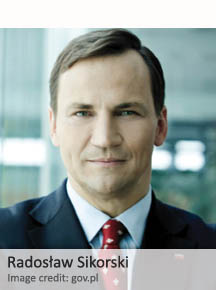Analysis: Did Russian spy services secretly bug Polish officials?
June 25, 2014 3 Comments
 By JOSEPH FITSANAKIS* | intelNews.org
By JOSEPH FITSANAKIS* | intelNews.org
Poland’s relations with the United States were strained this week after Poland’s foreign minister allegedly described Warsaw’s alliance with Washington as “worthless” and “complete bullshit” in a private conversation. Radosław Sikorski has not denied the authenticity of a bugged conversation, in which he appears to argue that Poland is wrong to anger Germany and Russia by always siding with America on foreign policy issues. Using highly undiplomatic language, Sikorski denounced Poland’s foreign policy planners as “complete losers” and accused them of having a “slave mentality” in their dealings with American diplomats. He also described British Prime Minister David Cameron as an “incompetent” politician who “believes in his stupid propaganda” about the European Union. Transcripts of the conversation, which allegedly took place between Sikorski and Poland’s former Finance Minister Jacek Rostowski, were published last week in several increments by Polish newsmagazine Wprost.
How did the bugging occur? It appears that Sikorski was among a number of Polish politicians surreptitiously recorded for over a year while dining with colleagues at elite restaurants in Polish capital Warsaw. Polish authorities reportedly believe that managers and waiters at the restaurants placed concealed recording devices near the guests’ tables. Some believe the culprits’ goal was to blackmail the politicians in return for cash payments; others believe that powerful business interests or opposition politicians were behind the recordings. A few observers have even suggested that Rostowski, who is heard talking with Sikorski in the bugged conversation, may have been the source of the leak to Wprost. The magazine’s editors said they received an encrypted email from a business executive, going by the name “Patriot”, with links to four recorded conversations between senior Polish government officials. But it insisted that it was not aware of the identity of the leaker.
There is also speculation that the Russian intelligence services may be behind the leak. The manner and style of the Wprost revelation is arguably reminiscent of a private conversation leaked earlier this year, in which a senior US official was heard dismissing the European Union’s policy on Russia as weak and inadequate. In a telephone exchange with Geoffrey Pyatt, US Ambassador to Ukraine, Victoria Nuland, Assistant Secretary for European Affairs at the Department of State, said the United Nations would “help glue” the situation in Ukraine, and added: “you know, f*ck the EU”. The intercepted conversation was posed in a Russian-language YouTube video. The view that Russia may be behind the latest leak is supported by the dramatic worsening of relations between Moscow and Warsaw, after the latter came out strongly in favor of the pro-Western rebel government in Ukraine. Additionally, the leaked transcripts appear to be focused largely on Poland’s foreign policy, hardly a high-priority subject for Polish voters, but a major issue for Russia’s leadership.
On the other hand, those who claim that only nation-states “would have the resources and expertise to expertly bug” several restaurants in Warsaw over many months probably underestimate the technical ease with which private conversations can be intercepted nowadays. Moreover, if Sikorski is indeed a closet Russophile, then Moscow would have little to gain by compromising his senior post in the Polish cabinet, or by terminating his political career in such an unceremonious manner. It is safe to say that, at this point, nobody has a clue who was behind the leak, and any accusations against Moscow or other possible culprits are inevitably conjectural.
Still, if the Russian secret services are indeed found to have a connection to the latest leak, their role should be examined within the context of what I called during the Nuland revelation “a populist form of intelligence-based approach”. This type of activity aims to publicly expose real or perceived cracks in the alliances between Russia’s adversaries in Europe and North America. I mentioned at the time that Moscow was trying to damage the credibility of its adversaries by communicating directly with Western populations —something that is perhaps reminiscent of the 1960 U-2 incident, though with the added factor of social networking outlets.
It is worth noting that police authorities in Poland raided the offices of Wprost last week, in an effort to obtain information about the identity of the leaker. Intercepting communications without the consent of participants is illegal in Poland. In responding to the highly damaging revelations, Sikorski and Polish Prime Minister Donald Tusk told reporters on Monday that their country was under attack by “organized criminal groups”.
* Dr. Joseph Fitsanakis coordinates the Security and Intelligence Studies program at King University. He is also Director of the King Institute for Security and Intelligence Studies.







Anyone have an idea if this Sikorski is related in some manner to the General Sikorski of World War Two fame?
No, there is no relation. General Wladyslaw Sikorski had a daughter but she died with him in a plane accident.
Thank you Polish officer!!